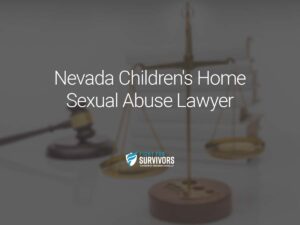
Introduction
Children living in residential homes and care facilities deserve to be safe, protected, and properly cared for. Unfortunately, cases of child abuse and neglect within children’s homes have been reported far too often. When a child is subjected to sexual abuse, physical abuse, or emotional mistreatment, it can leave lasting scars on their well-being and mental health.
If your child has been a victim of abuse in a children’s home, you need the support of an experienced Nevada children’s home sexual abuse lawyer. The legal team at Greenberg Gross LLP is committed to helping families seek justice, protect children, and hold the responsible parties accountable. With experience navigating the complexities of Nevada law, our attorneys will guide you through the legal process of filing civil claims and pursuing compensation for the harm your child has endured.

Understanding Child Abuse and Neglect
Under Nevada law, child abuse and neglect refer to acts or failures to act by a person responsible for a child’s welfare that result in harm or put the child at risk of harm. Abuse can be physical, emotional, or sexual, while neglect involves the failure to provide for a child’s basic needs.
Here are key forms of abuse and neglect that may occur in children’s homes:
- Physical abuse: This includes actions that result in bodily injury, such as hitting, kicking, or excessive corporal punishment.
- Sexual abuse: Any act of sexual molestation, sexual conduct, or sexual acts forced upon a child is considered abuse. Children in care homes are particularly vulnerable to sexual exploitation due to their reliance on caregivers.
- Neglect: Failure to provide proper supervision, food, shelter, or medical care is considered child neglect. Neglect may also involve exposing children to dangerous situations or environments.
- Emotional and mental abuse: Emotional mistreatment, such as intimidation, threats, or isolation, can cause mental injury and long-term harm to a child’s psychological well-being.
All of these forms of mistreatment are addressed in the Nevada Revised Statutes, which provide guidelines on how to identify abuse, report it, and pursue criminal or civil action against the perpetrators.
What is Considered Child Abuse or Neglect?
It is important to understand what is legally considered child abuse or considered child neglect under Nevada law. Child abuse or neglect can be defined as any act or omission that places the child at risk of physical, mental, or emotional harm. Examples include:
- Willfully causing physical harm or injury to a child.
- Failing to provide proper care, such as food, shelter, or medical attention.
- Allowing a child to be in a dangerous environment.
- Inflicting unjustifiable physical pain or suffering on a child.
These acts can lead to both criminal and civil cases, as well as severe criminal penalties for the person responsible for the abuse.
Signs of Child Abuse and Neglect in Children’s Homes
If your child is in a residential facility, watch for signs that could indicate abuse or neglect. Children may not always report their suffering directly, but certain behavioral changes can be warning signs:
- Unexplained injuries, such as bruises, burns, or fractures.
- Withdrawal from family, friends, or activities they previously enjoyed.
- Sudden changes in behavior, such as aggression, anxiety, or fearfulness.
- Regression in developmental milestones or skills.
- Complaints of physical pain or discomfort.
- Reports of inappropriate sexual conduct or other signs of sexual exploitation.
If you notice any of these signs, it’s essential to act quickly. Contact a Nevada children’s home sexual abuse lawyer to discuss how to file a report and begin the legal process.
Who Can Be Held Accountable for Child Abuse in a Children’s Home?
There are several parties responsible for the safety and well-being of children in care facilities, and multiple individuals or organizations can be held accountable for abuse or neglect. These include:
- Facility operators: The owners or managers of the children’s home are responsible for hiring qualified staff and ensuring proper supervision.
- Caregivers and staff: If an employee or staff member is accused of abuse, they can face criminal charges and criminal conviction, as well as civil liability in a civil case.
- Third-party contractors: If third-party vendors or contractors are involved in a child’s care, they can also be held liable if their actions contribute to the harm.
Accountability is essential to ensuring that no other child endures similar mistreatment. Filing a lawsuit with the help of a law firm like Greenberg Gross LLP can help bring justice to your family and prevent further abuse.
Legal Options for Victims and Families
If your child has been a victim of abuse or neglect, you have the right to take legal action. Our experienced attorneys will conduct a thorough investigation to gather evidence, identify the parties responsible, and pursue the compensation your family deserves.
Here’s what you can expect from the legal process:
- Report the abuse: Contact child protective services to ensure your child is removed from harm. Reporting the abuse also establishes a record of the incident.
- Consult an attorney: A Nevada children’s home sexual abuse lawyer can explain your legal rights and advise you on the best course of action.
- File a civil claim: This claim allows families to seek financial compensation for the abuse or neglect their child experienced.
- Seek compensation: Families may be entitled to financial compensation for medical expenses, mental suffering, and emotional distress caused by the abuse.
If you have concerns about filing a claim, speak to an attorney during a confidential consultation. Your child’s well-being and future are too important to delay.
Damages Available in Child Abuse Cases
The harm caused by child abuse and neglect is often long-lasting, impacting every aspect of a child’s development. Fortunately, civil claims can help families recover financial compensation for the following:
- Medical expenses: Costs for medical care, therapy, or psychological treatment required due to the abuse.
- Mental suffering and emotional distress: The trauma of abuse can lead to anxiety, depression, and other mental health challenges.
- Loss of quality of life: Children who experience abuse may suffer long-term mental injury, impacting their future relationships and emotional stability.
Seeking justice not only provides financial support but also holds institutions accountable for their role in the abuse.
Criminal Consequences for Child Abuse
In addition to civil lawsuits, abusers may face criminal penalties. Nevada law imposes harsh consequences for those convicted of child abuse or neglect, including jail time and fines. Individuals can be charged with gross misdemeanors or felonies, depending on the severity of the abuse.
The person accused of committing abuse may also face a criminal case that could result in incarceration, fines, and a permanent criminal record. While the criminal matter is handled by state prosecutors, the victim’s family can pursue a separate civil case to recover compensation.
Frequently Asked Questions (FAQ)
1. What should I do if I suspect child abuse in a children’s home?
If you suspect abuse, contact child protective services immediately. You should also speak to an attorney to discuss your options for legal action.
2. Can I sue the facility if my child was abused?
Yes. If the facility was negligent in supervising employees or failed to protect children, it can be held accountable for any harm caused.
3. What compensation can I recover in a child abuse claim?
Families may be able to recover compensation for medical bills, therapy, pain and suffering, and emotional distress. An attorney can help you assess the value of your claim.
4. How long do I have to file a claim for child abuse?
The statute of limitations for filing a claim depends on Nevada law. Speaking with a lawyer early ensures you meet any deadlines.
5. Can I pursue a case if child protective services were involved?
Yes. Even if CPS was involved, you can still file a civil claim against the facility or other parties responsible for the abuse.
6. What if the accused abuser denies the allegations?
False accusations can be a challenge, but a skilled attorney will present evidence to support your claim. Witness testimony, medical records, and incident reports can help prove the abuse occurred.
Contact a Nevada Children’s Home Sexual Abuse Lawyer Today
If your child has been sexually abused or subjected to abuse or neglect in a children’s home, don’t wait to take action. The attorneys at Greenberg Gross LLP are dedicated to protecting the rights of children and helping families recover from these traumatic experiences. Contact us today for a free consultation to discuss your case.